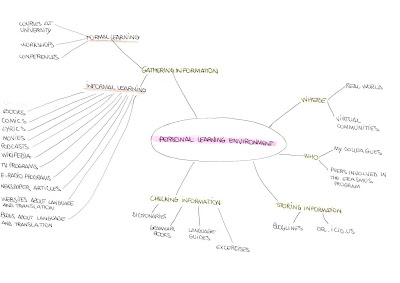As Wikipedia said "
Social bookmarking is a way for
Internet users to store, organize, share and search
bookmarks of web pages. In a social bookmarking system, users save links to
web pages that they want to remember and/or share. These bookmarks are usually public, but depending on the service's features, may be saved privately, shared only with specific people or groups, shared only inside certain
networks, or another combination of public and private. The allowed people can usually view these bookmarks chronologically, by category or tags, via a search engine, or even randomly.
Most social bookmark services encourage users to organize their bookmarks with informal
tags instead of the traditional browser-based system of folders, although some services feature categories/folders or a combination of folders and tags. They also enable viewing bookmarks associated with a chosen tag, and include information about the number of users who have bookmarked them. Some social bookmarking services also draw inferences from the relationship of tags to create clusters of tags or bookmarks.
Many social bookmarking services provide
web feeds for their lists of bookmarks, including lists organized by tags. This allows subscribers to become aware of new bookmarks as they are saved, shared, and tagged by other users.
As these services have matured and grown more popular, they have added extra features such as ratings and comments on bookmarks, the ability to import and export bookmarks from browsers, emailing of bookmarks,
web annotation, and groups or other
social network features".
I think
Social Bookmarking is very useful because you can find and save on a page of your computer your favourite websites and see them whenever you want. We did it with del.icio.us.As the e-tivity 5 concerned, I searched words that involve language learning or other subject matters I study. The websites I found contain a lot of funny exercises to improve my english and also to learn to teach english!
I found 5 very intersting websites/blogs:
- the first, "
English Club", contains English lessons, games, quizzes, blogs, forums, chat, lesson plans, jobs and more for ESL learners & teachers. This site can help you to learn English or to teach English as a second language.
- the second site, "
English as a second language Podcast", is about english as a second language podcast. A podcast is an audio file that you download from the Internet. After you download it, you can listen to it on your computer or on an MP3/portable music player (for example, an iPod or iRiver). This site has got also a blog, where people talk about daily matters, for example about tipping in a restaurant.
- the third is a
BBC site for who want to learn english having fun. You can learn english listening to the music, watching telefilms, doing quizzes and grammar exercises. You can check the words you don't know in an online vocabulary.
-
Speaking english as second language is about english pronunciation and speaking help including exercises, IPA help, lesson plans, conversation tips and strategies for ESL EFL classes and teachers. It's very useful for who want to learn and also to teach english.
Visiting the websites my classmates choose, I noticed very similar bookmarks to the mine, also because the topic we had to look for was the same, more or less.
From Elena's bookmarks I appreciated
A dictionary of english phrasal verbs which is an online dictionary that provides the meaning of 2533 current English pharasal verbs. It is possible to search for them typing either the verb or the preposition we require. It is very useful when we are not sure about the right verb to use and its preposition.
From Giada I choose
How to Use English Punctuation Correctly. I think punctuation is a weakness of many Italian students who study english. The website aims to clarify how to use punctuation marks properly when writing in English. The Website offers a series of tips about writing using a formal register as well.
The most interesting bookmark of Silvia is
English Listening Language Lab Online-Learn English Naturally, a huge source of listening activities, this website provides plenty of talks and interviews. Slides, transcripts of the audio files and funny quizzes offer you a valid support in understanding the conversations.
From Zara's bookmarks I choose
Common Errors in English, a website focusing on common mistakes among English native speakers. (And if native speakers make mistakes, imagine us who are learning english!!!!) I think this site is very useful to see which are the common errors in english and to try avoiding them!!!
Quotes of the Day-The Quotations Page is another nice websites Zara choose which contain quotes every day new. There is also a weblog section where people can discuss about meaning and worth of various quotes.
In the end I can say we have the possibility to learn english in thousand ways and with very different tools. With del.icio.us and our favourite bookmarks we can do it in the best way.
I'm looking forward to see your impressions of social bookmarking!
See you soon!
Bye bye!
Letizia


 This is
This is